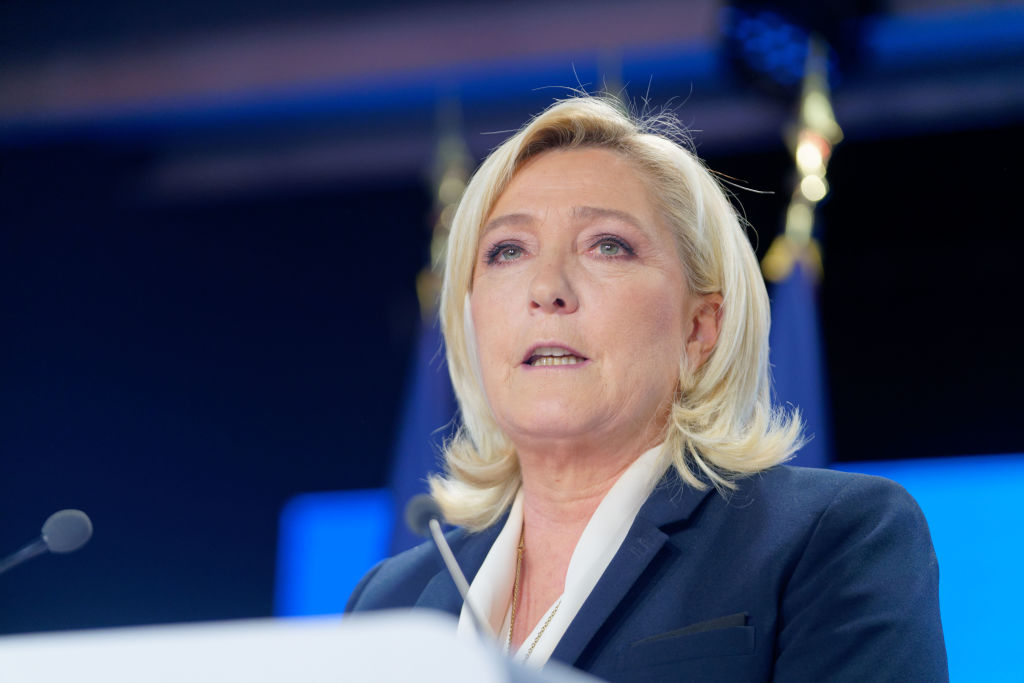Emmanuel Macron is not happy. He would love to run for a third term as president but the French constitution precludes such a prospect. Last week, he described the rules as “bloody disastrous,” a declaration that earned the president a reprimand from Nicolas Sarkozy in a television interview on Wednesday.
The former president has been busily promoting his memoirs in recent weeks, discoursing on all manner of subjects from Putin to mass immigration to the 2027 presidential election. It’s his belief that his former party, the center-right Republicans, can be resurrected, but only if they “take risks.” That means a coalition, similar to the one that swept Giorgia Meloni to power in last year’s Italian elections.
Maréchal’s ambition is to be the French Meloni, but that is also the dream of Marine Le Pen
“Without unity, the right has no chance of winning,” declared Sarkozy. The priority is to “find a leader capable of bringing together the friends of Messrs Zemmour, Macron and Ciotti.” If they fail in this task, warned Sarkozy, then they will “boost the National Front.”
It was no accident that Sarkozy referred to Marine Le Pen’s National Rally by their former name. There is no love lost between the pair. In 2015, Le Pen described Sarkozy as her “no. 1 political enemy.” She has consistently reminded her supporters over the years that it was Sarkozy who, as president in 2007, betrayed the “No” referendum result of two years earlier on the European Constitution.
In misnaming the National Rally, Sarkozy’s intention was to remind his still substantial fan base that Marine Le Pen is the daughter of the far-right Jean-Marie, who founded the party half a century ago. A vote for her, in other words, is not acceptable.
Sarkozy had no qualms about referencing Éric Zemmour, whose manifesto in last year’s presidential election was more right-wing than Le Pen’s, both culturally and economically. That election was generally regarded as a failure for Zemmour, although in his first political foray he still picked up 7 percent of the vote (2.4 million ballots), which was nearly a million more than the Republican nominee, the experienced if hopeless Valérie Pécresse.
Since that debacle, the Republicans have replaced Pécresse with Eric Ciotti, whose views differ little from Zemmour. A coalition, therefore, between the Republicans and Zemmour’s Reconquest party is not out of the question. They attract the same types of voter: the retired, the middle class, the socially conservative and the economically liberal.
Many of these backed Macron in the last election, not out of any great love for the president, but because they couldn’t stomach the thought of Marine Le Pen in the Élysee. Not so much because they believe she is a fascist but rather that they regard her as economically illiterate.
Nonetheless, the left-wing newspaper Liberation is sufficiently alarmed by Marine Le Pen that this week it ran a prominent feature warning its readers of the danger of the “banalization” of the National Rally leader. As evidence of this normalization of Le Pen, the paper published the results of a survey it had conducted, revealing that 44 percent of the public believe she has “solutions for France; this is up 8 percent from a similar poll in 2021.
Who is this 44 percent? According to a book published this week by the celebrated French economist Thomas Piketty (co-authored with Julia Cagé) entitled A History of Political Conflict, the bulk of Le Pen’s supporters are blue-collar workers who live in the provinces. They vote for Le Pen, not because they are racist but because they feel abandoned by Paris; it is in the rural areas where France has been hit hardest by deindustrialization.
In the cities, by contrast, where the service industry is much stronger, Le Pen struggles much more to win over the working class. As for Macron, Piketty describes his electoral base as “the most bourgeois in history.”
If a potential right-wing coalition is to be successful it must appeal to both the working-class provincial vote and the bourgeois electorate. Sarkozy recognizes this, and so does Reconquest. They have long called for a right-wing union but so far they have been rebuffed by Le Pen and her party, who believe they can triumph on their own.
They are mistaken. The bourgeois will never back Marine Le Pen in any great number.
Her niece, however, is another matter. Marion Maréchal, who represented the National Front in parliament between 2012 and 2017, has always been considered far more palatable than her aunt. More charismatic and more confident than Le Pen, the thirty-three-year-old Maréchal threw her support behind Zemmour in last year’s presidential election.
On Wednesday, Zemmour announced that Maréchal will lead his party at next year’s European elections. The declaration has generated much excitement within the right-leaning print and broadcast media. The news made the front page of Le Figaro — inside Zemmour explained his decision: “I want her to be supported by the whole of the younger generation, from all the right-wing parties, who rallied round me during the presidential election.”
Maréchal’s appeal has always been broader than her aunt’s. She cuts across generations and classes. More socially conservative than Le Pen, and more economically liberal, Maréchal is arguably the only person capable of forming a coalition. And that is her intention.
“We have the opportunity to unite right-wing voters around a major civilizational, historic and vital battle, that of defending our identity, our culture and our values,” she said in a television interview on Wednesday evening.
Maréchal’s ambition is to be the French Meloni, but that is also the dream of Marine Le Pen. The battle of the blondes is likely to be ferocious — after all, pride as well as political careers are at stake.
This article was originally published on The Spectator’s UK website.

























